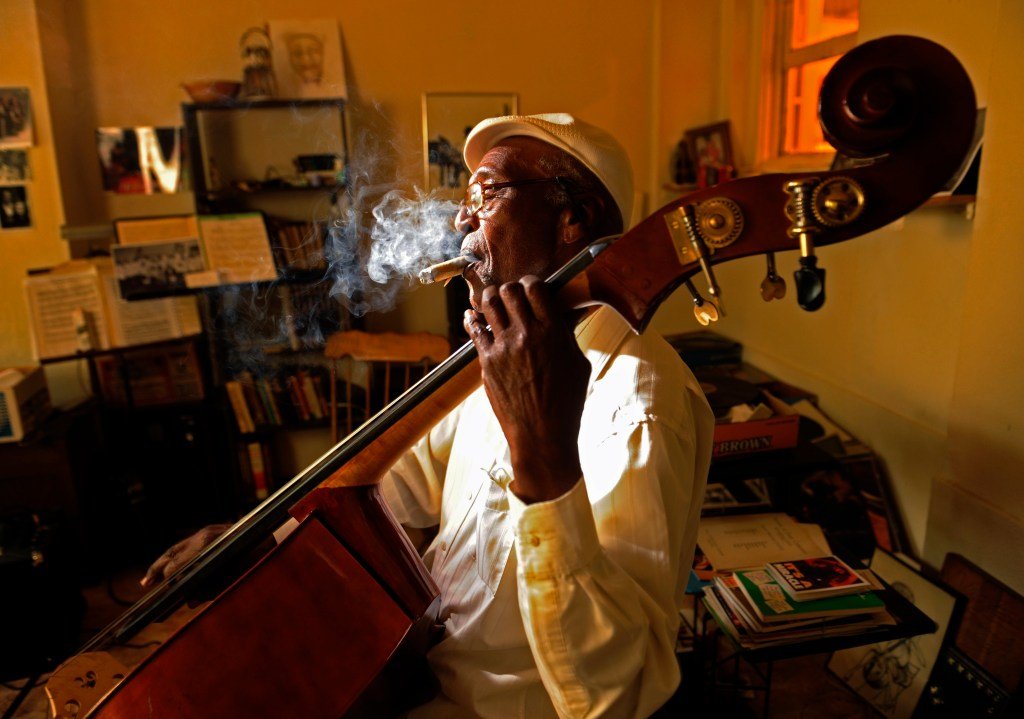Whatever folks knew about renowned classical and jazz bassist Charles Burrell – that he was one of the first Black musicians to sign with an American symphony, that he played alongside the likes of jazz greats Billie Holliday and Duke Ellington or that he was a cornerstone of Denver’s music scene – the man himself was exponentially more.
A longtime Coloradan and trailblazing musician widely considered the Jackie Robinson of classical music, Burrell died early Tuesday morning in Denver from natural causes. He was 104 years old.
Family members knew Burrell as not only a musician who was remarkably dedicated to his craft, but as someone who deeply loved and cared for his fellow man.
“My uncle was someone who walked in excellence,” said Dianne Reeves, a Grammy-winning jazz singer and Burrell’s niece. “He was about being the best at what he did and I witnessed that. Staying at his house, four in the morning before the birds started chirping, he would be practicing.”
Burrell was also a true humanitarian, Reeves said, freely giving his time, skills and resources to anyone in need.
Almost every hospital chaplain in Denver knew him by name because he so frequently visited people who were sick, Burrell’s cousin and jazz pianist Purnell Steen said Thursday.
“He had the heart of a lion and the endurance of an elephant,” Steen said. “He was the most benevolent man. He was always giving. However, you didn’t want to cross him. He was small but mighty.”
Steen’s memories of his cousin and father figure are countless, from Burrell coming by for old-fashioned southern fish fries cooked by Steen’s mother to Burrell’s elation when he found out Steen had started playing piano.
In one of their many “life training lessons,” Steen remembers riding a bicycle around City Park in 1952, trailing Burrell as the older man ran in high-top, white canvas Keds with a smoldering pipe clenched between his teeth.
“I had so many cinders in my eyes I would be crying,” Steen said, laughing. “I would fall off at one and a half laps, and two or three laps later he would walk up, slightly winded, and say, ‘Want to go play some tennis?’”
So many people recognized Burrell in part because he walked almost everywhere, Steen said. When a camera crew once came to his home in the Skyland neighborhood for an interview, they found Burrell doing chin-ups in the cherry tree out front.
For all of his accolades, Burrell never really saw himself as the giant he was, Steen said.
“He could not grasp the magnitude of what he did. He said, ‘All I want to do is play music,’” Steen said. “He did not get the credibility he should have gotten, he did not get the notoriety. He lived for three quarters of a century in splendid obscurity and we don’t want his footprint to be erased.”
Burrell was born Oct. 4, 1920, in Toledo, Ohio, to Ruben and Denverado Burrell. Raised in Detroit as one of eight children, he caught the music bug early when he heard the San Francisco Symphony on his family’s crystal radio, according to the Colorado Music Hall of Fame.
Burrell honed his skills throughout high school and college as well as in the U.S. Navy, where he played in the Navy band with trumpeter Clark Terry.
He was honorably discharged and moved to Denver in 1949 after realizing there was no future in the Motor City for a Black man who played classical music, Steen said.
That same year, he signed with the Colorado Symphony, then known as the Denver Symphony Orchestra.
Symphony officials described him as a “towering figure in American music” and a Colorado icon in a statement Tuesday.
“His courage, artistry and trailblazing spirit forever changed the face of classical music. Charlie’s legacy echoes through every note we play and will forever resonate in Denver and beyond,” they said.

In 1959, Burrell realized his dream of playing with the San Francisco Symphony and moved to California, where he stayed for five years before returning to Colorado after the 1964 Alaska earthquake spawned a tsunami that caused extensive damage along the West Coast.
He performed with the Colorado Symphony until his retirement in 1999 and continued to mentor musicians, frequenting shows at Dazzle Jazz and visiting with musicians who performed at the club until shortly before his death.
He is survived by three of his children and numerous other family members, both related by blood and by heart.
Memorial service details have not been announced.
Get more Colorado news by signing up for our daily Your Morning Dozen email newsletter.













Leave a Reply